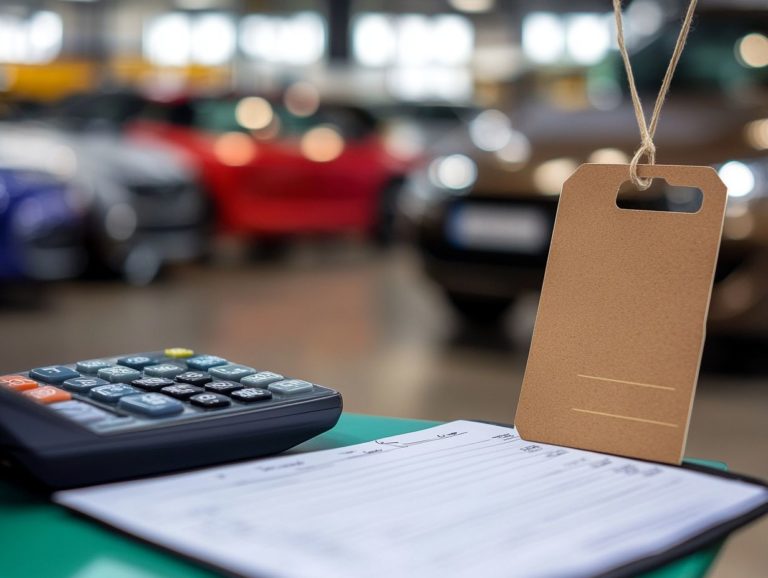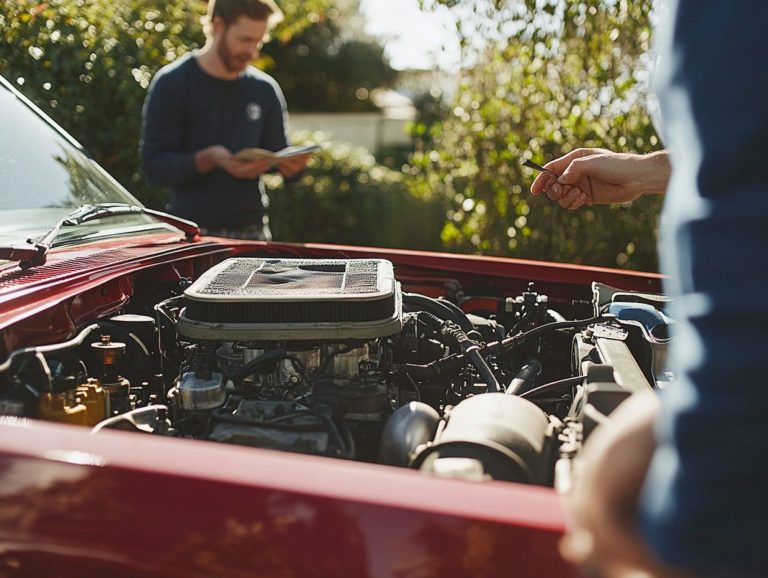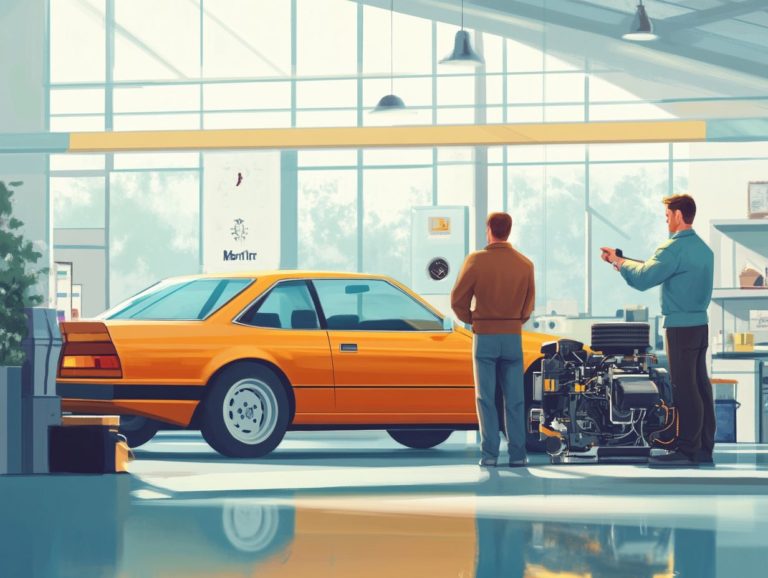5 Myths about Buying Used Cars
When it comes to purchasing a vehicle, you might find yourself caught between the allure of shiny new cars and the practicality of used ones.
Navigating the used car market often brings along its own set of misconceptions. Let s debunk five common myths about buying used cars, shedding light on their reliability, long-term costs, and resale value.
You ll also discover how to make a savvy purchase and secure the best deal possible. Whether you’re a first-time buyer or looking to upgrade, grasping these myths can empower you to make a more informed decision.
Read on to uncover the truth behind these common beliefs and the key factors you should really consider when buying a used car.
Contents
- Key Takeaways:
- 1. Used Cars Are Unreliable and Prone to Breakdowns
- 2. Used Cars Are More Expensive in the Long Run
- 3. You Have Limited Options When Buying a Used Car
- 4. Used Cars Have a Lower Resale Value
- 5. It’s Better to Buy a New Car with a Warranty
- What Are the Advantages of Buying a Used Car?
- Frequently Asked Questions
Key Takeaways:

- Used cars can be just as reliable as new cars with proper maintenance and inspection.
- The overall cost of owning a used car can be significantly lower than a new car due to lower purchase price, insurance, and depreciation.
- There is a wide variety of used cars available in the market, giving you more options to find the perfect fit for your needs and budget.
1. Used Cars Are Unreliable and Prone to Breakdowns
The belief that used cars are inherently unreliable and prone to breakdowns is a myth. This misconception often keeps buyers from considering the used car market, where 5 tips for buying a used car from a dealer can help ensure a smart purchase.
Many used cars especially those with verified vehicle histories and maintained at trustworthy car sellers in San Diego can offer exceptional reliability and longevity. Understanding the factors that influence a used car’s reliability is essential for making an informed decision during your buying journey.
It’s a common misconception that once a car is pre-owned, it automatically loses its reliability. Studies show that a significant percentage of used vehicles can surpass 200,000 miles with the right care. Regular vehicle inspections and thorough history checks are vital, as these practices help identify any hidden issues before you make a purchase.
In San Diego, dealerships like California Motors Direct and Auto City, known for their stringent quality control, offer a selection of used cars that have been meticulously vetted for reliability. Industry reports confirm that vehicles from these dealerships maintain high satisfaction ratings, proving that the right choice in the used car market can lead to dependable and affordable transportation.
2. Used Cars Are More Expensive in the Long Run
There’s a prevalent misconception that purchasing a used car will inevitably lead to higher long-term costs compared to investing in a new vehicle. However, this isn’t always true, especially when you explore various financing options and potential savings from cash payments. For those considering luxury options, checking out 5 tips for buying a used luxury car can help make a more informed decision.
Opting for a used car can provide significant upfront savings, and with proper maintenance, these vehicles often experience lower depreciation rates, contributing to a more favorable financial decision.
Insurance costs for used cars tend to be more budget-friendly, allowing you to direct funds toward other essential expenses. For example, a three-year-old car usually attracts much lower premiums, while new vehicles often come with the added expense of comprehensive coverage. Maintenance for used vehicles can be more predictable, particularly when you choose models renowned for their reliability.
By selecting a well-chosen used car, such as a certified pre-owned model, you can benefit from competitive resale values and potentially outperform numerous new car financing deals regarding total cost of ownership. This makes investing in a quality used car a financially savvy choice.
Explore the used car market today and discover incredible deals that save you money!
3. You Have Limited Options When Buying a Used Car
The idea that the used car market has limited options is a misconception that can keep you from finding the perfect vehicle for your needs. Reputable dealerships offer a rich selection and competitive prices. To enhance your buying experience, consider these tips for buying used cars at a dealership while exploring the value for your old car and the variety of vehicles available.
With an impressive array of makes and models, from dependable sedans to robust SUVs, the used car market truly caters to diverse preferences and budgets. Dealerships are vital in this landscape, not only providing a wide selection but also the expertise to navigate financing and warranties confidently.
Understanding trade-in values boosts your negotiation power! For those who invest time in researching options, finding that ideal vehicle is not just a possibility it s within reach.
4. Used Cars Have a Lower Resale Value

A common misconception is that used cars always have a lower resale value than new ones, which can lead you astray when evaluating the true worth of your investment. When considering car guide prices and market demand, some used models hold their value remarkably well, making them a smart choice for long-term financial implications.
Resale values depend heavily on factors like brand reputation, vehicle condition, and market trends. Cars from brands like Toyota and Honda are known for their durability, often leading to better resale prices.
The recent surge in demand for SUVs and trucks has shifted market dynamics significantly. To maximize your vehicle’s resale potential, keep comprehensive service records and ensure your car stays in excellent condition.
Simple strategies, such as regular detailing and prompt repairs, can enhance your vehicle’s appeal when it s time to sell.
5. It’s Better to Buy a New Car with a Warranty
Choosing a new car with a warranty seems safe, but many used cars offer great benefits too! They can rival the perks of a new car warranty, especially when you consider potential warranty scams during dealership financing. Understanding various warranty options for used cars, including extended warranties, empowers you to make a more informed decision.
A certified pre-owned vehicle may come with a manufacturer-backed warranty, offering peace of mind that can stand up to a new car.
It s crucial to investigate the specifics of these warranties, as they aren t all created equal. Researching your warranty options reveals what s covered, any exclusions, and how claims are processed.
While some may find that a used car warranty offers exceptional value, others might fall prey to aggressive sales tactics promoting unnecessary or overpriced warranty packages. Understanding both sides can significantly influence your satisfaction and financial outcome when buying a vehicle.
What Are the Advantages of Buying a Used Car?
Buying a used car offers a wealth of advantages. You’ll enjoy cost savings, better gas mileage, and a wider selection in the used car market.
With the right research and understanding of what to look for, you can discover excellent vehicles that fit your needs without the hefty price tag of new cars.
Purchasing a pre-owned vehicle often means lower insurance rates, as older cars generally cost less to insure. This can lead to substantial long-term savings, a benefit many buyers appreciate as they manage their budgets.
The variety available in the used market allows you to explore different makes and models. This ensures you find something that perfectly matches your style and preferences.
When you combine all these factors, it s easy to see why so many people feel satisfied with their choice to go for a used car, relishing the experience of getting more for less while still embracing quality and reliability.
How Can You Ensure the Reliability of a Used Car?
Ensuring the reliability of a used car requires a thorough approach. This encompasses reviewing the vehicle history, conducting meticulous inspections, and examining maintenance records.
Each of these elements provides critical insights into the car s performance and longevity. This allows you to significantly minimize the risk of acquiring a problematic vehicle.
First and foremost, obtaining a vehicle history report is essential. This document unveils past incidents, such as accidents or salvage titles, which could impact the vehicle s value and safety.
During the inspection, take the time to visually assess the car for signs of wear, rust, or misalignment, both inside and out. A test drive is paramount to gauge its handling and overall performance, allowing you to truly feel how the car responds.
Don t overlook the importance of reviewing maintenance records. This documentation reveals major repairs and routine services that have been performed, giving you confidence that the vehicle has been well cared for, further cementing its reliability.
What Factors Should You Consider When Buying a Used Car?

When you embark on the journey of purchasing a used car, there are several crucial factors that deserve your attention. Consider elements like financing options, safety features, and fuel efficiency, as these can significantly impact your satisfaction and the long-term costs of ownership. Additionally, be sure to check out 5 tips for buying a used car from a private seller to ensure a smooth transaction.
First and foremost, establish a realistic budget that encompasses not just the purchase price, but also ongoing maintenance and insurance costs. Delving into various financing options, including loans and leases, can provide valuable insights into the most economical paths available to you.
Never overlook safety features such as airbags and anti-lock brakes; they are vital for the protection of both you and your passengers. Understanding gas mileage helps you budget for fuel expenses effectively.
By prioritizing these elements during your buying process, you can simplify decision-making and ensure that your choice aligns with both your immediate needs and future aspirations.
Ready to find your perfect used car? Start your search today and enjoy the benefits of smart purchasing!
How Can You Negotiate a Good Deal for a Used Car?
Negotiating a great deal for a used car is a critical skill that can save you a substantial amount of money. Mastering effective negotiation strategies will enhance your experience at the dealership and ensure you receive fair value for your trade-in.
Approaching the negotiation process with confidence can lead to an outcome that aligns perfectly with your financial needs. At the core of successful negotiations is the necessity of being well-informed about the car’s market value.
This knowledge enables you to confidently counter any offers the dealership presents. Dive into thorough research using reliable websites and resources to establish a solid understanding of the vehicle’s worth, allowing you to craft compelling arguments during discussions.
Leveraging trade-in values effectively can further enhance your financial standing. A well-documented history of your car s condition can significantly bolster your position. It’s also important to recognize when to walk away from a deal that falls short of your expectations this move can often prompt the seller to reconsider their offer.
Understanding dealership financing terms can help you. Exploring external financing options is wise, as it ensures you secure the best rates while negotiating, putting you in a stronger position to make the most of your deal.
What Are the Most Common Myths About Buying Used Cars?
Used cars come with many myths—let’s clear those up! Many believe that older models are inherently unreliable or that they depreciate more rapidly, which can misguide you as a potential buyer. To make informed choices in the used car market, it’s essential to explore the top 5 questions to ask before buying a used car and debunk these myths.
You might think that a vehicle loses most of its value the moment it leaves the dealership, but statistics tell a different story. In fact, some used cars maintain their value exceptionally well, making them a savvy investment.
In terms of reliability, numerous studies indicate that well-maintained vehicles, regardless of their age, can be just as dependable as their brand-new counterparts.
There s also a common misconception surrounding warranties; many buyers assume that used cars lack warranty coverage. In truth, many dealerships offer certified pre-owned programs programs that sell inspected used cars with warranties giving you peace of mind and protection against potential issues.
By understanding these realities, you can navigate the used car market with greater confidence.
Is Buying a Used Car a Good Financial Decision?
Evaluating whether purchasing a used car is a wise financial decision involves considering various factors such as cost savings, depreciation rates, and overall customer satisfaction. These elements can indeed make a compelling case for investing in a pre-owned vehicle.
You may discover that choosing a used car often leads to a more prudent financial choice compared to buying new. This decision not only reduces your immediate out-of-pocket expenses but also minimizes long-term financial commitments.
For instance, while new vehicles can lose value rapidly up to 20% in the first year alone used cars typically depreciate at a slower rate, allowing them to retain their resale value more effectively. Additionally, insurance premiums for used cars tend to be lower, providing another layer of affordability.
Recent surveys reveal that many customers express high satisfaction rates, highlighting lower overall costs and reliable performance as significant advantages. In fact, over 80% of used car buyers report being pleased with their purchase, reinforcing the idea that a pre-owned vehicle can be both economical and enjoyable.
Frequently Asked Questions

What are the top 5 myths about buying used cars?
The top 5 myths about buying used cars include beliefs that they are unreliable, have hidden damage, are too expensive, have high mileage, and are difficult to finance.
Is it true that used cars are unreliable?
No, this is a common misconception. With proper maintenance and a thorough inspection, used cars can be just as reliable as new cars. However, there are 5 things to consider before buying used to ensure you make a wise choice.
Now that you know the facts, get ready to negotiate your best deal!
No, not necessarily! Getting a pre-purchase inspection is important.
Most reputable dealerships will tell you about any known damages or issues with the car.
Are used cars more expensive than new cars?
Not always! Used cars can be more affordable than new ones.
Especially if you have a specific make and model in mind.
Do used cars have high mileage?
No, many used cars actually have low mileage.
They may have been well-maintained by their previous owners. It really depends on the specific car you are considering.
Is it difficult to finance a used car?
No, financing a used car is quite possible!
Just like new cars, there are many financing options available. A little research can help you find the best deal.






